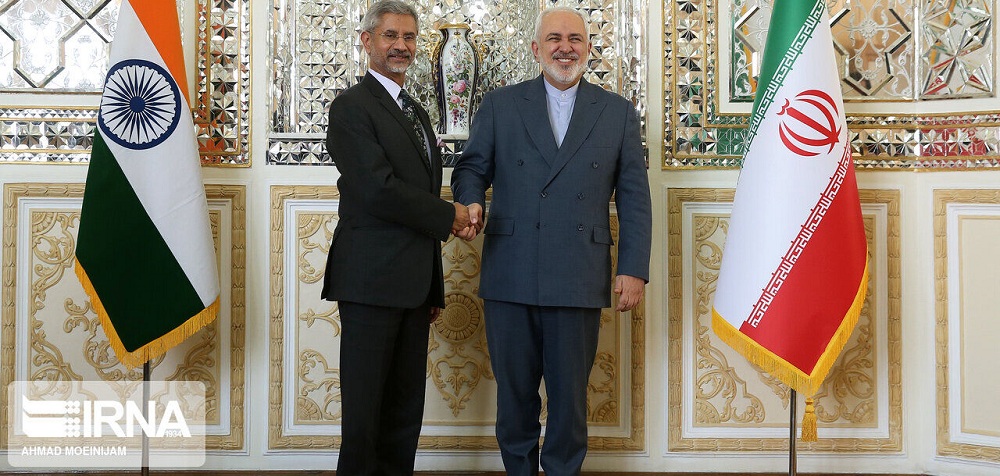Alwaght- India’s Foreign Minister Subrahmanyan Jaishankar has arrived in Iran for a bilateral two-day conference hosted by Tehran. India, a significant business partner to Iran, is now under a complicated test of loyalty as the US sanctions the Islamic Republic's economy.
India-Iran trade relations
Iran and India have long-term cultural, economic, and political relations. Until the US reinstated its economic sanctions on Tehran, the Iranian trade exchange with India was $15 billion a year. This volume accounted for 2 percent of India’s international trade. Before the US ban, the country was the second biggest Iran oil importer after China. Iran exported 300,000 to 440,000 oil barrels per day to India.
Iran sent oil and fertilizers, and chemicals to India and imported cereals, sugar, tea, coffee, and other products. The bilateral trade volume from 2016 to 2017 was $12.9 billion. It hit $13.8 billion by end of 2018. Oil money, about $10 billion, accounted for a large part of this sum, giving Iran an 11-percent share in the Indian oil market.
When Trump in May 2018 withdrew from the Iran nuclear deal and re-imposed new sanctions on Tehran, New Delhi initially said that it will not follow the US embargo. New Delhi stated that it seeks to keep 300,000 oil barrels imports from Iran. The Iranian oil was of advantages for India. For example, Iran provides India with a 60-day credit period for repayment while other suppliers, like the US and Saudi Arabia, did not make such an offer. Since November 2018 that eight countries received waivers from sanctions to buy the Iranian oil, only state Indian companies like Bharat Petroleum, Hindustan Petroleum, and Mangalore Refinery bought the Iranian oil.
Bilateral ties under the sanctions
In the time of six-month waivers, New Delhi tried to explore new channels for the India trade level with Iran to sustain. In December 2018, the Indian ambassador to Iran at a Tehran conference, themed “India, a Window Beyond Sanctions”, discussed the ways to maintain trade ties with Iran. Regarding the banking sector, he proposed two ways: One, using the rupee payment mechanism with UCO Bank of India as a payment agent to facilitate trade relations under the sanctions. The ambassador proposed that Iranian oil money will be deposed in this bank in rupees without being taxed. He also proposed to use rupee for trading non-sanctioned products. Two, using the SPV mechanism (Special-Purpose Vehicle), a sanctions-circumventing financial system planned by the European Union for trade with Iran. The conference offered other choices for trade with Iran to be maintained, including “preferential trade agreement”, accelerating Iran’s Chabahar Port development by Indian investment, facilitating visas for two countries businesspeople, and targeting $20 billing trade exchange.
But when Trump waivers expired, India in an abrupt shift abandoned all of its pledges to maintain trade with Iran. A Reuters report showed that at the time of the expiration of exemptions, India cut its oil purchases from Iran by 45 percent. By that time, India was the only Asian nation to cut the oil buying from Iran to the lowest level, though Iran kept its commitments for imports from India.
The Indian tea exports to Iran tripled in the first quarter of this year. According to a July report published by The Economist, the price of the Indian tea exported to Iran rose 7.54 percent reaching 269.62 rupees for a kilogram.
Even though Iran could buy sugar from Brazil as the world’s largest supplier of the product, it chooses to continue its purchases from India in line with the past agreements. Business Standard newspaper in October, quoting Indian sources, reported Indian companies held contracts to export 350,000 tons of sugar for October to December period. In the same period last year, Iran bought 150,000 tons from India.
Future outlook
India proposed to Iran maintaining exchange through the barter system. In this case, New Delhi focuses the most on Chabahar Port in Iran’s east. The US exempted the port development project from sanction to allow a path for sending strategic commodities to Afghanistan. Due to political tensions with Pakistan, India cannot export important products like wheat to Afghanistan. The current Chabahar Port’s capacity is 2 million tons. If developed, the port can pass 8.5 million tons of wheat to Afghanistan. The Indian ambassador to Iran highlighted the Chabahar project’s significance saying that trade expansion through this route will considerably promote the bilateral trade.
So, one reason the Indian FM visited Tehran is Chabahar port trade expansion. Before the FM’s visit, a trilateral meeting was held attended by Indian, Iranian, and Afghan representatives in New Delhi. Indian Express newspaper reported that the Indian government is committed to investing $500 million in the port project and $1.5 billion to build a network of roads and railroads linking India to Iran and Afghanistan. According to a statement by the Indian government, half a million tons of products bound to Afghanistan have begun to arrive in the Iranian port since February.
India attempts to encourage Iran to engage further in non-oil trade. This appears to be one objective of the Indian FM who came to attend the Iran-India 19th trade summit. But the important point is that such an objective is a long-run one while India should now fill the vacuum caused by cutting Iran oil imports. The Print news website of India, quoting unknown sources, reported in June that India mulls resuming oil imports from Iran even in limited amounts. This means that the FM presence in Iran provides a chance to discuss obstacles ahead of oil imports from Iran. After all, limiting the energy sources of such emerging economies as China and India will be of negative political impacts and will give a pressure tool to the US against them. Moreover, Tehran’s role in Persian Gulf energy flow and Afghanistan stability falls in the same path with New Delhi’s interests, making Iran a reliant energy provider for India.



























